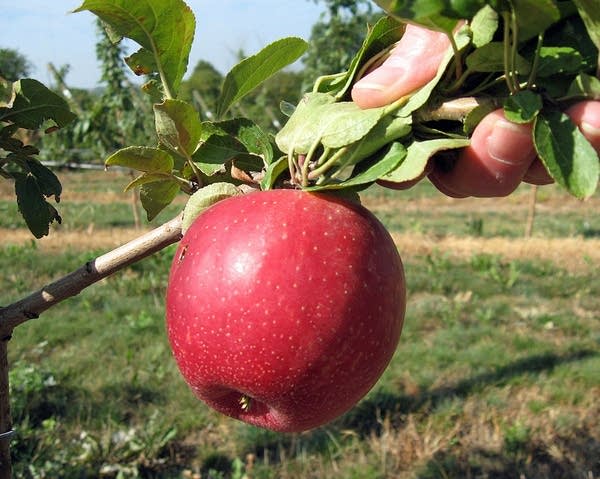Sweetango agreement riles some apple growers
Go Deeper.
Create an account or log in to save stories.
Like this?
Thanks for liking this story! We have added it to a list of your favorite stories.

The University of Minnesota's newest apple, the Sweetango, made its debut earlier this month as the successor of the wildly popular Honeycrisp.
But some independent apple growers aren't happy with the exclusive agreement between the university and one southern Minnesota grower.
Since its debut on Labor Day weekend, the Sweetango has been nothing short of a hit. It's already selling out at supermarkets and farmers markets around the state, and University officials believe the Sweetango may one day surpass the success of the Honeycrisp.
But not everyone's thrilled.
Turn Up Your Support
MPR News helps you turn down the noise and build shared understanding. Turn up your support for this public resource and keep trusted journalism accessible to all.
"If you will, the apple growers are having a food fight," said Karl Townsend, the owner of Dassel Hillside Farm in Meeker County
Dassel Hillside Farm is a roadside market Townsend has owned since 1982. Townsend objects to the exclusive agreement between the U and Pepin Heights, the state's largest apple grower.
The agreement is a first of its kind. Until now, all other apples released by the university have been public. That means all growers can plant and market the apples after paying a one-time fee.

But the new agreement makes Pepin Heights the primary grower of the Sweetango, and Townsend says that's unfair.
"Really, Sweetango can be the poster child for putting small, local growers out of business," he said. "I just feel it's terribly unethical of the university to select one grower to form a monopoly with this apple."
University officials say making the Sweetango a more exclusive release will help Minnesota apple growers in the long term.
Bev Durgan, director of the Minnesota Agricultural Experiment Station, said the university learned a big lesson with the Honeycrisp after some growers planted trees in places not particularly suited for the apple, like Texas.
"So because of that, they are more readily available, the quality isn't good, and so the price of the Honeycrisp is going down," Durgan said.
And keeping prices high is what's driving this decision.
Durgan said the university has to make money on the new variety to keep funding its breeding program. She said state and federal dollars continue to decline.
So the U has chosen to be much more exclusive this time around. In all, about 6.5 million Honeycrisp trees have been planted worldwide, generating more than $8 million in royalties for the U.
So far, there are only about 60,000 Sweetango trees in the ground in the U.S. and Canada. Durgan said the university is determined not to overexpose its newest hit.
"With the Sweetango, by keeping a more limited supply of that apple at the beginning, and also where it's going to be grown, we can assure a higher quality apple and can maintain the price for Minnesota growers for a longer period of time," Durgan said.

Pepin Heights Vice President, Tim Byrne, said under the agreement with the U, independent growers in Minnesota can still plant up to 1,000 Sweetango trees and sell the fruit at roadside stands or farmers markets.
But only those in a national co-op can sell directly to commercial buyers like grocery stores. Some small growers say not being able to sell to wholesale buyers means they can't really afford to plant the newest big thing to hit the apple market.
Byrne said 88 of the state's 107 apple producers have signed on as independent growers.
"Is it a perfect system? Probably not," he said. "Does it exclude some people? Yes, out of state, it does. No one can grow it. I've taken about 150 phone calls from growers in Michigan and New York and California and Washington who want to grow this apple and I have to tell them no."
Byrne said Pepin Heights is helping all Minnesota growers by building a strong brand for the Sweetango -- which they can then use on a smaller scale to market the apple.
"So we hope that our work on behalf of making an audience for this product has had a halo effect in that the audience take advantage of that opportunity to use that Sweetango name and capitalize on the public awareness of it and maximize their revenue on it," he said.
Some small growers may not be happy with the arrangement now, but the success of the Sweetango is likely to determine how the university releases apples in the future.
Dear reader,
The trustworthy and factual news you find here at MPR News relies on the generosity of readers like you.
Your donation ensures that our journalism remains available to all, connecting communities and facilitating better conversations for everyone.
Will you make a gift today to help keep this trusted new source accessible to all?





